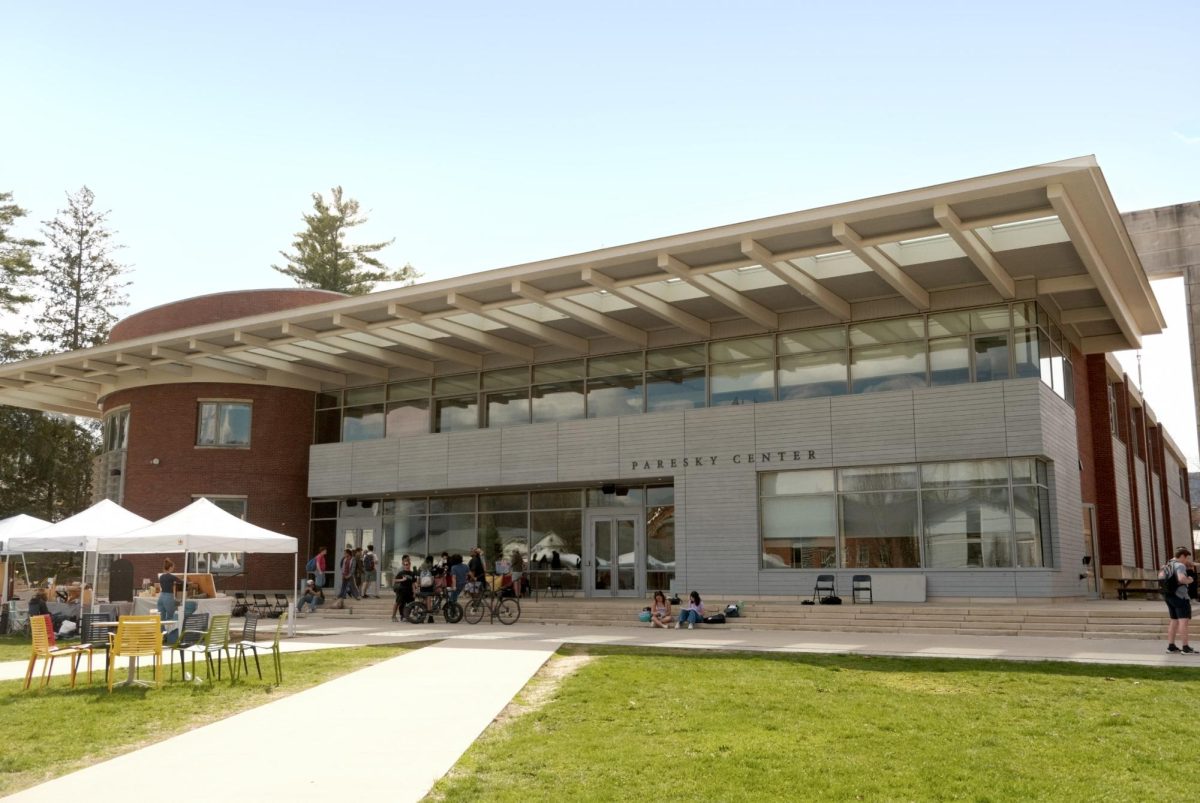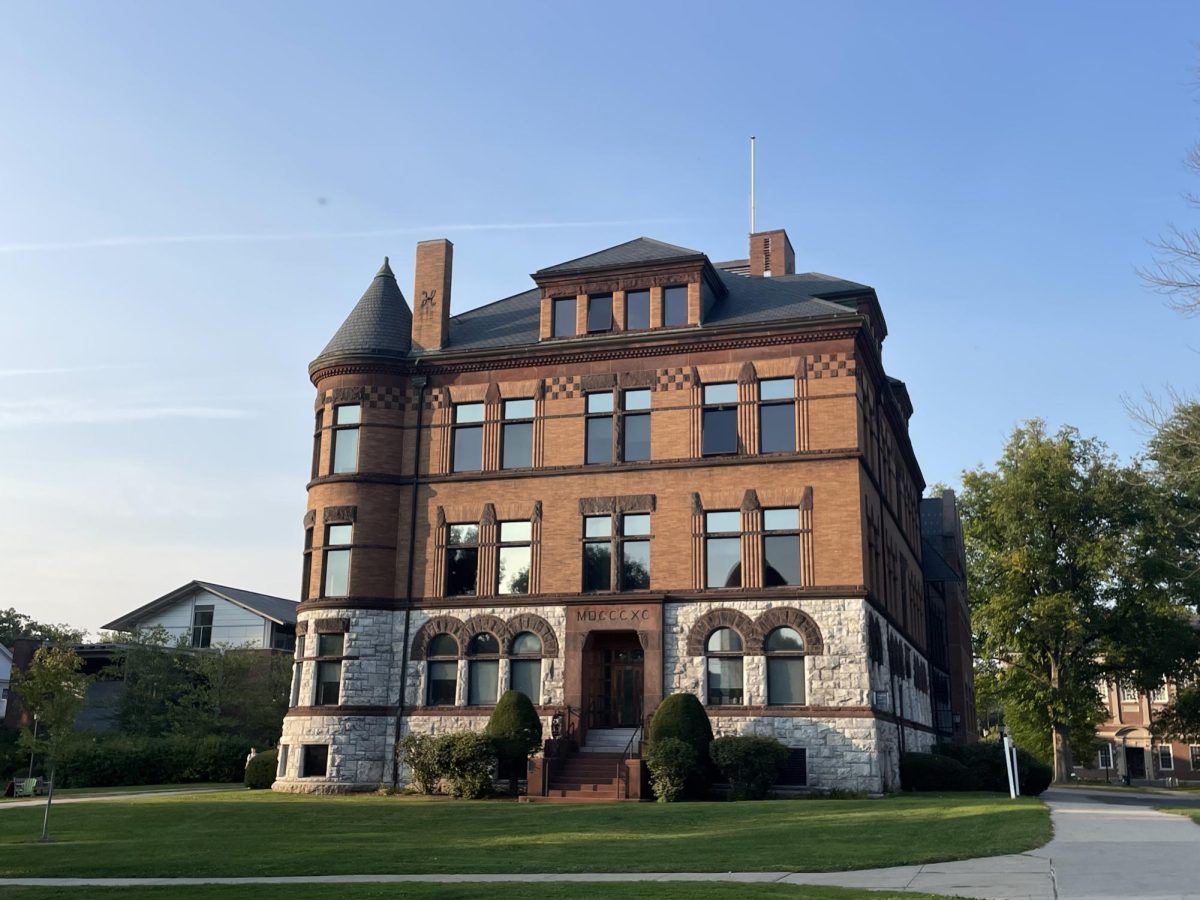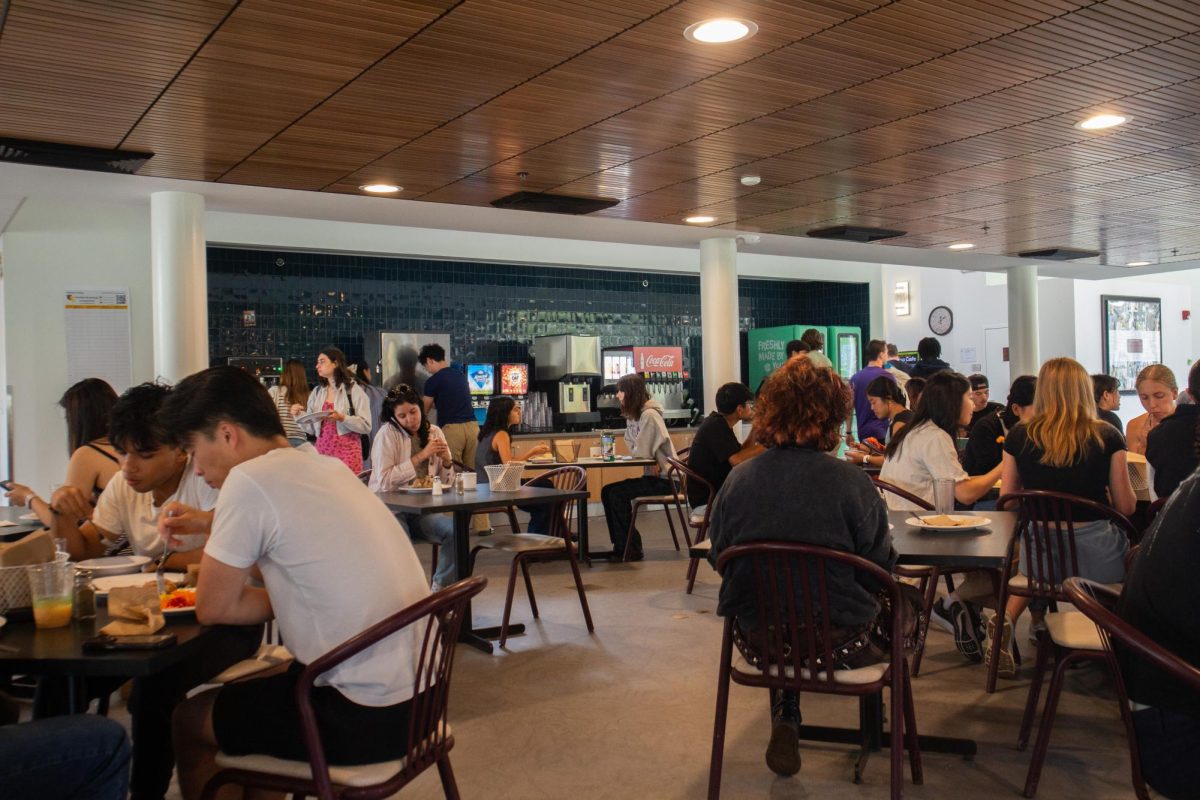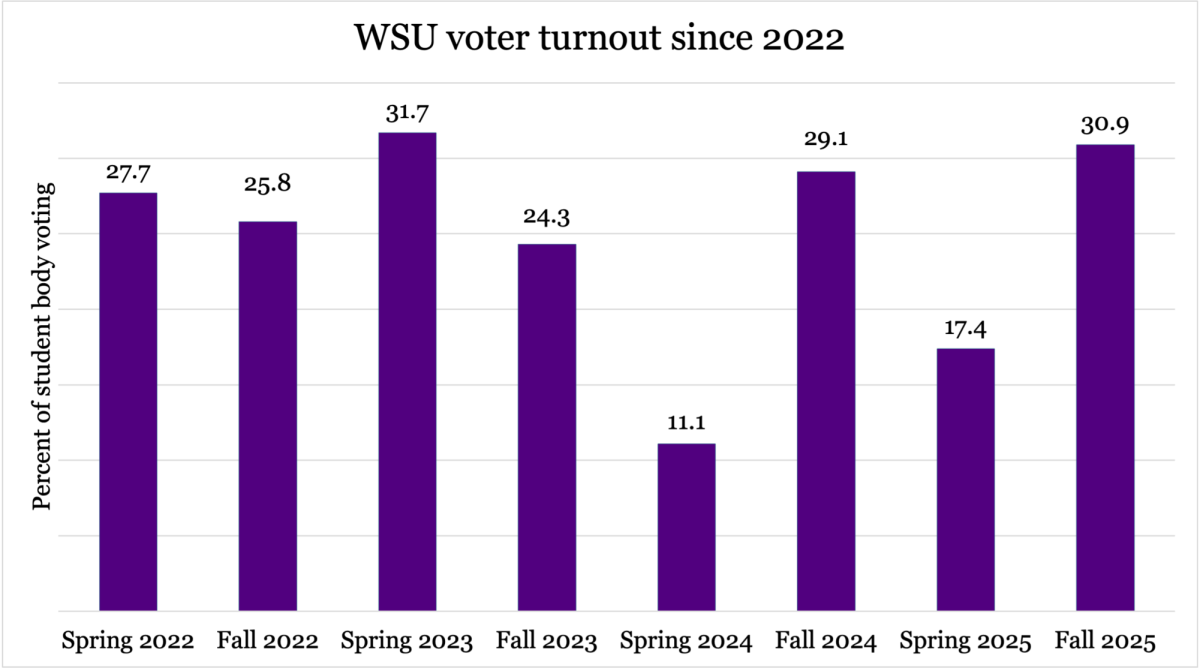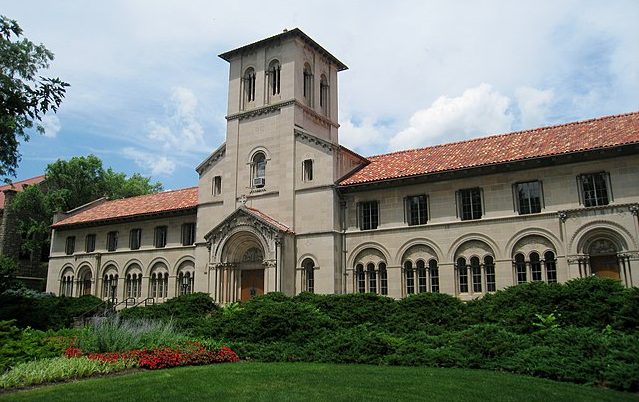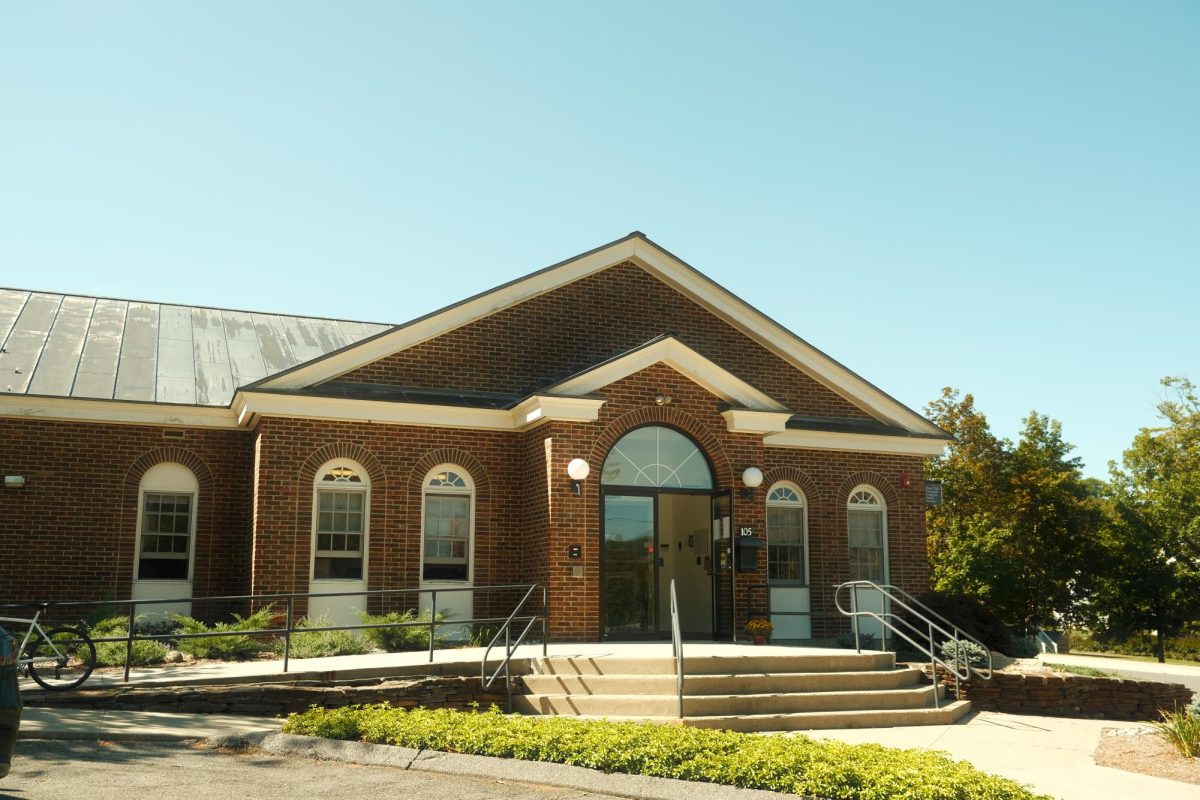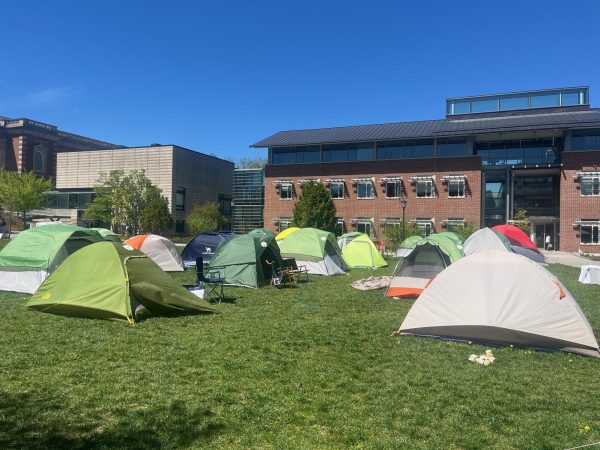
Students for Justice in Palestine (SJP) and Jews for Justice (J4J) have continued their encampment on Sawyer Quad into its second week. The encampment, which began at 4 a.m. last Wednesday, joined a wave of campus protests across the nation in which students have set up encampments. The protestors demand changes to schools’ investment practices and public stances in order to “divest from genocide [and] … stand in solidarity with Palestine,” the two groups wrote in a joint statement released last Wednesday. In the statement, SJP and J4J called for the College to “implement increased transparency and ethics” in its fiscal practices and “divest the College’s endowment from weapons manufacturing supplying Israel.”
On Tuesday at approximately 2 p.m., the Record counted 38 camping tents on Sawyer Quad, along with tables of food and drinks, blankets, lawn chairs, and pavilion tents for shade. The encampment, termed the “Popular University for Gaza,” has held workshops, teach-ins, and group meetings throughout the week. During peak hours, up to 80 people have attended Popular University events held at the encampment, a spokesperson for SJP wrote in a statement to the Record on the condition of anonymity. Approximately 30 or 40 people stay overnight, they wrote. The spokespeople for SJP and J4J have been granted anonymity by the Record due to their concerns for their safety.
The College has not made any effort to close the encampment. On May 1, President of the College Maud S. Mandel sent an all-campus email acknowledging the encampment and reaffirming that encampments themselves do not violate College rules, as long as they remain compliant with the Code of Conduct and campus protest policy. “In short, the student participants enjoy the same protections, and are subject to the same rules, as all students,” she wrote.
In a statement to the Record, the SJP spokesperson reiterated SJP’s commitment to maintaining the encampment. “The encampment is set to stay up indefinitely,” they wrote.
Last Wednesday morning, the day the encampment began, SJP sent an email to Mandel. In an interview with the Record, Mandel described it as “a thoughtful email” with two main demands. The email urged the College to “implement increased transparency and ethical practices across the College’s financial strategy,” and “divest the College’s endowment from weapons manufacturers supplying Israel,” according to Mandel’s May 1 all-campus email.
Last Wednesday night, J4J and SJP released a 20-page comprehensive report on divestment elaborating on the justification for the groups’ divestment demands. “With this report, we are showing the administration that we have done our research and that our call for divestment is just, urgent, widely supported, and actionable,” the groups wrote in a statement shared in a joint Instagram post from SJP and J4J on May 1. The report recommends databases for screening companies and funds for investment and includes statements of support from students, alums, and 16 student organizations and performance groups.
The Investment Office manages the College’s $3.48 billion endowment with an objective to “achieve the highest level of investment performance that is compatible with its risk tolerance and prudent investment practices,” according to its website. The office’s annual investment reports share some information about the endowment’s management. In 2023, hedge funds managed about 38 percent of the endowment, according to the annual investment report for that year. Hedge funds are fund managers that manage assets like endowments. They are often opaque about their fund management practices, allowing them to engage in riskier investment strategies. In an all-campus email about the College’s investment strategy, sent on April 8, 2022 in the wake of calls to divest from fossil fuels, Mandel wrote that the College does not have any direct investments. “Rather, the endowment is invested in funds that then invest in public and private companies.”
According to the “Investment Strategy” section of the Investment Office’s website, the office chooses which funds to include in its portfolio in order to maximize endowment returns. The evaluation criteria of fund managers, or companies whose business is investing others’ funds, includes the following questions: “Is the manager following the strategy initially articulated? Is performance in line with what we expected? Is there an inappropriate amount of manager team turnover? How are macroeconomic factors affecting this manager’s strategy?”
SJP and J4J demand in their report that the College implement additional evaluative criteria to “review companies for divestment.” Demanded criteria may include questions such as: “a) Does the company maintain contracts selling weapons (e.g.: guns, explosives, white phosphorus) or vehicles (e.g.: tanks) to the Israeli Defense Forces? b) Does the company sell reconnaissance tools used by Israeli Defense Forces (e.g.: drones or surveillance software)? c) Does the company sell weapons or vehicles used by Israeli Defense Forces police?”
Two students told the Record that at about 10 p.m. last Wednesday night, they hung posters outside the Paresky Center of the Israelis held hostage by Hamas following the Oct. 7 attack. The posters were captioned “KIDNAPPED,” and the contact email listed was “[email protected].” The posters were affiliated with the #KidnappedFromIsrael project, which is an unfunded campaign that seeks to bring attention to the Israelis held hostage by Hamas and is “one of the most widespread guerrilla public artworks in history,” according to its website.
The following morning at around 9:40 a.m., the posters were taken down by a student, according to Joey Kauffman ’27, who was leaving Paresky and saw posters being removed. Kauffman said he was not able to identify the student.
At 12:30 p.m., approximately 70 student protestors linked hands and marched from the encampment to the lawn outside of the Paresky Center. Still holding hands, the students formed a circle around the flagpole and chanted for about 20 minutes. The chants included slogans such as “Williams College, you can’t hide, you’re supporting genocide,” “From the river to the sea, Palestine will be free,” and “What do we want? Divestment. When do we want it? Now. If we don’t get it, shut it down.”
Starting at about 12:50 p.m. that same day, the original group of students that hung the posters of Israeli hostages was joined by more students, who together replaced them on the front windows of Paresky and added more. In an interview with the Record, Arielle Levy ’26, one of the students rehanging the posters, explained that she desired to express her views in a manner that she said is similar to the encampment. “It’s important to me that people also understand that there’s death on both sides,” she said. “Everyone has the right to freedom of speech. It feels as though the hostages are not being talked about.”
The same day, Hannah Bae ’24 and Aliza Cotton ’26 led a divestment teach-in at the encampment covering the content of SJP and J4J’s 20-page report and distributed printed copies to attendees. The report has been in the works since the beginning of the spring semester, Cotton told the Record in an interview on Thursday. A Google form petition supporting SJP and J4J’s divestment demands had 305 signatures from the community by Tuesday afternoon, Cotton said. A letter written by alums to Mandel and the Board of Trustees supporting the demands and pledging to withhold donations listed 692 signatories as of Tuesday afternoon.
On Thursday evening at around 10:50 p.m., around five students walked up to the encampment and began to question protestors. “[They] were like looking at the schedule and asked if they could take some of our water, which of course they could,” said the spokesperson for J4J. “And then they walked up and some of them started looking into people’s tents.”
One of the students began “playing horror movie noises on his phone, like doors squeaking and people screaming,” they said. According to the J4J spokesperson, there were “two primary instigators” who began to argue with those present at the encampment. “They were like, ‘These tents are empty, no one’s actually sleeping here, it’s all just a performance,’” the J4J spokesperson said. When asked to leave, as encampment quiet hours begin at 11 p.m., the students reportedly said, “It’s always the case with people like [you] that it’s never the right time to talk.” Eventually, the five students left.
In a statement to the Record, the spokesperson for SJP wrote that their group chooses “not to engage with counter protesters who are not engaging with us in good faith.”
On Friday morning, four representatives from SJP and J4J met with senior members of the administration including Mandel, Dean of the College Gretchen Long, Dean of the Faculty Lara Shore-Sheppard, and Vice President for Institutional Diversity, Equity, and Inclusion Leticia S.E. Haynes ’99. Mandel told the Record that the meeting discussed the timeline of the encampment’s continued presence on campus. “I asked if they had given any thought to a pathway out — what they imagined was going to happen with the encampment and what their thinking was,” she said. “They didn’t answer that question at the time, [but] they said they would be in touch with me again.”
Mandel also proposed appointing a liaison from the administration to the encampment to discuss practical matters such as safety concerns about an electrical cord running from Schapiro Hall to the encampment. At present, Director of Pathways for Inclusive Excellence and Co-Director of the Davis Center D. Clinton Williams is acting in this role. Mandel stated that student representatives said they would get back to her when the organizations agreed on who else might definitively assume this role. In a statement to the Record, the SJP spokesperson wrote, “The Davis Center is not our liaison with administration, we communicate with admin directly.”
On Friday morning, several of the rehung hostage posters outside of Paresky Center were defaced. In an email to the Record, Mandel said, “I am deeply troubled by the on-going defacement of posters at Williams… In a contentious time with many strong feelings, members of our community are understandably sometimes angered by the views of others. Nevertheless, silencing others’ views through the defacement or destruction of their posters and artwork is never okay.”
The defacement of the posters elicited at least one report of a bias incident to the OIDEI. After a friend texted her photos of the defaced posters on Saturday morning, Ariella Scheer ’26 filed a bias incident report on OIDEI’s website at the advice of Rabbi Seth Wax. “This is something that obviously affects nearly all students at our school, but especially our Jewish students, who I know put up the posters,” Scheer said in an interview with the Record. “It was a poster about hostages — innocent civilians — that were just drawn over, and I felt like that was upsetting.”
“I think if any poster was defaced with violent speech it should be reported to OIDEI,” she wrote to the Record in a follow-up message.
Following the removal, replacement, and subsequent defacement of the hostage posters, SJP posted a statement to its Instagram story on Saturday condemning the “markings of hostage posters,” as they wrote. “This is not the way to support SJP and our cause of liberating Palestine… this is not aligned with SJP’s principles and we urge you to regroup, ground yourself, and look at our principles doc again if you would like to continue supporting or actually being apart of SJP by aligning yourself with those principles.”
On Monday, SJP posted a photo of Long removing pro-Palestinian posters and banners from the Mark Hopkins gate to their Instagram story. Long confirmed in an email to the Record that last week she removed posters that violated the College’s poster policy after receiving an email about the posters from a community member. “The posters didn’t have contact information; were a safety hazard, since they were covering the steps of Hopkins Gate; and had been affixed with glue,” she wrote. Long wrote that she chose to remove the posters herself, “hoping to spare Campus Life staff from dropping what they were doing.” She wrote the posters’ placement on Mark Hopkins gate, where seniors often shoot graduation photos, was not a contributing factor to the removal of posters.
On Tuesday around 12:45 p.m., approximately 22 protestors joined hands and marched from the encampment to Paresky to advocate for their demands, congregating on the grass in front of the flagpole. Led by a protestor with a megaphone, chants included slogans such as “Trustees, trustees, you can’t hide, you’re supporting genocide,” “From the river to the sea, Palestine will be free,” and “What do we want? Divestment! When do we want it? Now! If we don’t get it, shut it down.” The group returned to the encampment around 12:55 p.m.
Many of the tents at the encampment are rentals from the Williams Outing Club (WOC) equipment room. Last week, WOC rented out nearly all of its tents not reserved for programming use, co-president of WOC board Abby Murphy ’25 wrote in an email to the Record. WOC director Ben Oliver confirmed there are only around 10 tents available for rent. Bae told the Record that the tents not rented from WOC were personal tents or crowd-sourced from the community. Murphy added that WOC also rented out around 30 sleeping bags and pads last week.
Equipment is typically allowed out for a week, and borrowers are charged $1 for each day overdue, Murphy said. “The WOC tents were rented out last Monday, but WOC is not charging anyone using WOC equipment for the encampment if the equipment is overdue,” Murphy wrote in an email to the Record. She added that WOC does not have rules about political usage of their equipment. “Everyone in the encampment has been treating the equipment respectfully, so we are not concerned about WOC tents being in the encampment,” she wrote.
[Editor’s Note: Record editors participating in the encampment were not involved in the writing or editing of this article.]
Izzy Polanco, Lena Kerest, Haley Zimmerman, and Phoebe Pallesen contributed reporting.
Correction: A previous version of this piece incorrectly stated that five students questioned protestors at the encampment on Wednesday evening. It happened on Thursday evening. The piece was updated online to reflect this change on May 8 at 1:34 p.m.









